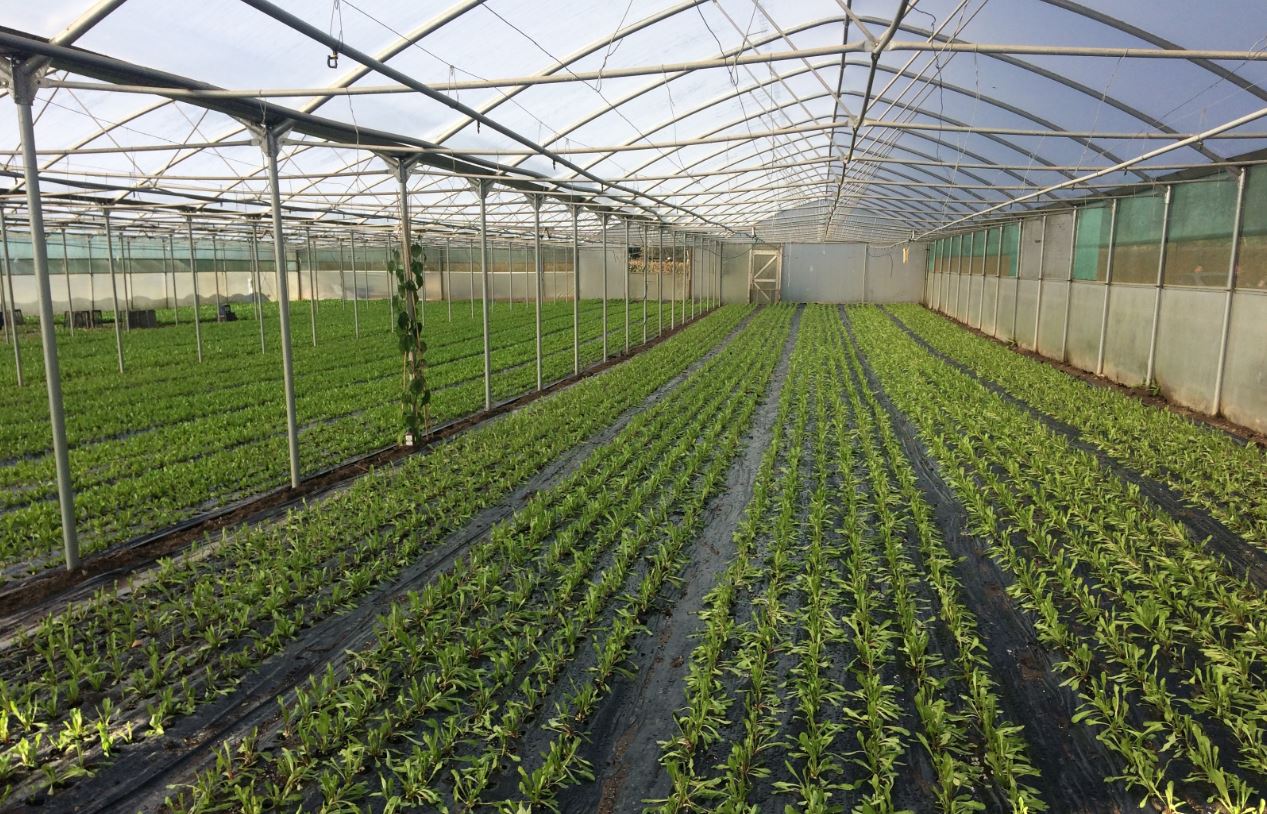Meteorologically, it has been a near perfect spring; a gloriously bright, dry, and sometimes even hot April has allowed us to plough, spread muck, and plant – with just enough frost and chilly easterlies to keep us honest.
Most farmers self-isolate by choice anyway (it comes with the job); add to that the new-found appreciation for food, and I reckon we are the lucky ones. My heart goes out to those locked in flats, especially the young and their care-givers, and to less fortunate businesses.
There is still plenty of moisture in the soil at depth, but newly planted lettuces, pak choi and chard already need irrigation, to help their emerging roots reach the water below. In the polytunnels, the lettuces, rocket, baby chard, claytonia and mustard that we have been harvesting all winter are coming to an end; as temperatures rise and days lengthen, they become hell-bent on reproduction, throwing out seedheads rather than the leaves we want.

With the first tomato plants now arriving, we will spend a manic three weeks ripping out the winter salads, spreading compost, cultivating the soil, and replanting the tunnels with summer crops of tomatoes, cucumbers, basil, chillies, aubergines and peppers.
Outside, this will be the final week for harvesting purple sprouting broccoli, leeks and spring greens, with the last cauliflowers not far behind, before we plunge into the depths of the Hungry Gap and must wait for our newly planted crops to come through.
We have one more week of foraging for wild garlic in some north-facing woods before their leaves go yellow and lose flavour; as the tree leaves above emerge to shade them out and end the season, the plants put their last energy into flowering and forming the bulbs that will carry them through to next spring.
Our farm offices are almost empty, as anyone who can do so adjusts to working from home. As well as the carbon savings of far fewer people driving to work, early signs are that many of us are actually able to get more done. Necessity really is the mother of invention; these changes to our ways of working that could and should have happened anyway have been massively accelerated with, to everyone’s surprise, relative ease.
I hope that when this is all over, we are all more willing to consider embracing other changes that we want and our planet needs, with the same openness that we have embraced these changes which have been forced upon us.













Guy, I was just reading that the national appeal to get British farm workers has fallen a bit flat, and it seems largely that people who registered their interest lost that interest because of the requirements to go live in group accomodation (I’ve heard a lot of it isn’t very nice, either) away from home for weeks or even months on end. Can you give us any insight on how this works for Riverford, and any ideas/thoughts on how things could change to be better for pickers, etc.?
Hi Susan, thanks for flagging that, We’d be interested to see a link to that story if you have it? Riverford has been lucky in terms of pickers thanks to lots of local applicants, who wouldn’t have to travel far to the job, but can imagine it’s a very different story in different parts of the country. There are also longer-term implications as the labour shortages have been building since Brexit and before – as the eastern economies strengthen, it is less appealing to work in the UK.
Thanks – I will share that if I can find it again! It was on my random news feed on my phone, and I didn’t pay attention to where it was from because I thought it must be common knowledge amongst the farming community. I would like to find out more about farm worker accomodation and any other issues that lead to problems and shortages. I imagine that the huge, industrial farm model leaves people open to all sorts of abuse, especially if they are foreign and don’t feel they have places to turn…and what can be done. Just another thing to campaign about for change to agriculture! I think you guys are amazing and would love to help spread your way…
Thanks Susan and I imagine there will be much more exploration of this issue in the coming months.
Hi, I’m not sure this is the article but it covers the same info I referred to, from the Guardian: https://www.theguardian.com/environment/2020/apr/17/british-workers-reject-fruit-picking-jobs-as-romanians-flown-in-coronavirus
They mention hours, location, and other duties in the subtitle, but they quote a man from Norfolk talking about farms requiring you to live on site, which I do remember reading…
Thanks! I look forward to all the articles you have in store for us 🙂